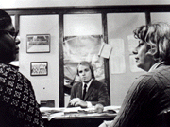 |
| Will Devon (Bryton E. James) and Hilary (Mishael Morgan) reunite? |
Last Thursday's Young and the Restless episode offered a wondrous peek at a much needed "Hevon" reunion. To see Devon smiling at Hilary again was a coveted treasure, the rosy satin ribbons torn off with greedy relish, the unexpected gift a welcome sight to behold. With forced pairings endured between Hilary and a bad version of Malcolm Winters and Devon and his red haired gold digger, I had almost forgotten what Devon and Hilary looked like together-- when truly happy and falling back into sweet friendship that blossomed into utterly romantic everlasting love.
Hilary arrives at the athletic club fresh from working out, looking quite stunning. Devon couldn't take his eyes off his beautiful ex-wife. Their light, affable banter resembled old time goodness.
Later, they continue having friendly chat over iced waters. It was a few minutes of bliss: the way they stared at each other, smiled, grinned, with Hilary doing the hand reach. Bryton and Mishael played each beat skillfully, making us hunger for any little tidbit of revealed emotion. They delivered tantalizing morsels, feeding our craving, our unsated hearts needing more and more. In fact, I'm still clutching my chest from weeks ago. Hilary had boldly gazed at Devon dead in his eyes, barely blinking, stating without hesitance, "would your girlfriend like the way you're staring at me right now?" Devon outright blushed and spoke no further. That scene in combination with latest developments prove that Hevon is rising like a phoenix out of dust.
 |
| Exhibit A: Devon watches Hilary drink her glass of water. Oh how his eyes are looking at her and she at him over her rim. |
 |
| Exhibit B: Hilary observes Devon emulating her earlier action-- gulp, gulp, gulp. But is he really thirsty for water? |
Months later, after a nonsensical divorce under a foolish writing regime, Hilary and Devon crashed immediately into other relationships. The signatures weren't even dry before Hilary succumbed to mediocre seduction by a weak, watered down photographer who couldn't even hold the base for the candle to the pure dynamism Malcolm brought. Now he is not the point. Neither is Devon's settlement. The important pairing, the true love epic is Devon and Hilary. They are the missing part of each other's lives. It has been quite interesting seeing Hilary interact with other characters like Victor and Nick Newman, forming a bond with Chelsea, and others. The audience has long since criticized that the black figures don't engage outside of their circle. That brings us to Devon, who though is dating an important family member (Newman?), he seems to be stuck with his very evil adoptive dad or Lily, his high horse sister.
 |
| This short cute scene watered soil on our hopeful hearts. |
Hevon fans have been used to being blamed ever since the beginning. Truth remains, Hilary only loved one man and took her gratitude way too far. Yes, Hilary and Devon had an affair. It lasted for months. Still, people continue ragging on them, refusing to let this old story die. Currently, Devon's replacement is falling hard for another woman! Instead of cheering the chemistry and celebrating Y&R's descent into 21st century, people are upset and calling out the Hevon base, holding them responsible for this poor woman's newfound lesbianism. It is quite a ridiculous call, especially when several popular soap opera accounts chime in, spilling the same trite. Despite campaigns, presents, letters, and wishes, the fans are not responsible for the writers' decisions. We might have impact from time to time, but in the end, the writers' have a vision set forth in stone. Thus, soap fans, who are starting to sound like grating bigots, need to pin their frustrations elsewhere. Don't pick on a fanbase that has yet to receive a story outside of insipid interferences.
I will state this for the umpteenth time-- soap opera writers need to stop believing that formulaic triangles/quadrangles are the best ways to keep a couple interesting. Nope.
I will state this for the umpteenth time-- soap opera writers need to stop believing that formulaic triangles/quadrangles are the best ways to keep a couple interesting. Nope.
 |
| In happier times, Devon and Hilary spent wedded bliss in a shared penthouse (aka a real home) after months of staying at the GCAC. Things seemed so peachy (and chocolaty) back then. |
For now, it's annoying and detestable filler, but someday soon these two will realize that these dull, time wasting pursuits are nothing like the magical splendor they have together.
I love Hevon. So many people love Hevon. We root for Hevon. Until they get back together, no other couple takes their shine.
 |
| Devon's swoon worthy smile speaks volumes. |
Only time will tell what happens. The new writing regime is just getting started. Tomorrow, Hilary supposedly spins into Devon's orbit again. Fall sweeps promises that their undeniable bond smothers the Genoa City landscape. Let's pray hard for friendly fires to keep sparking, steadily grow into something once more, that special blaze that these happy people were blushingly discussing last week. This slow, tentative burn is surely going to scorch the small screens all over again.
And frankly I cannot wait.
And frankly I cannot wait.






































